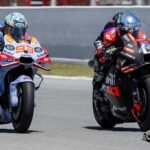KTM’s latest achievement in Portimão, where it solidified its position as Ducati’s closest competitor in MotoGP, isn’t an isolated incident; rather, it’s a testament to their sustained pursuit. This proven formula of success isn’t novel; it has been effectively applied in various other sporting arenas.
In motorsport, setting up a team involves more than just selecting a talented driver. It’s a collaborative effort where each member plays a crucial role, akin to the various players in a football team. While the spotlight often shines on the driver, success hinges on the collective contributions of everyone involved.
Take KTM, for example: Brad Binder excels at finishing races, analogous to the striker scoring goals. Jack Miller serves as the strategist, orchestrating moves and guiding the team’s direction like a playmaker on the field.

Test drivers like Pól Espargaró, Dani Pedrosa, and Jonas Folger may operate behind the scenes, but their tireless efforts are essential for the team’s success, akin to midfielders doing the grunt work.
Then there’s the wildcard factor, embodied by Pedro Acosta, a young prodigy unburdened by constraints.
He injects an element of spontaneity and unpredictability, akin to the X-factor in football. His fearless approach adds a dynamic edge to the team’s performance.
In essence, a winning team in MotoGP, like in any sport, requires a diverse mix of talent, strategy, and innovation, with each member contributing in their unique way towards the ultimate goal.
In our analogy, Pit Beirer assumes the role of the goalkeeper rather than the coach. He serves as the steadfast guardian of the team’s defense, ensuring stability even when facing intense pressure.

Despite any criticism directed at KTM in recent years, Beirer has remained resolute, never shying away from challenges.
This sets him apart from his counterparts who may have been more transient in their roles. Such consistency is only possible with the unwavering trust of the team’s owner, Stefan Pierer.
Pierer, akin to the coach, provides the necessary support and resources for the team’s development. He responds to demands for increased investment in electronics, aerodynamics, and overall team improvement by establishing state-of-the-art facilities like the modern racing department in Munderfing. In MotoGP, as in any sport, the ultimate goal is victory.
While emotions and marketing play a role, the true essence lies in the pursuit of knowledge, the cultivation of a winning culture, and the expansion of the team’s capabilities.
Different approaches exist within the sport. For instance, Honda adopts a rotational management strategy, where leaders switch between various divisions to foster a broader understanding and interest within the company. However, MotoGP’s specialized nature makes such approaches less feasible today.

Historically, Japanese teams favored a model centered around small, highly specialized racing teams with strategic individuals at key positions. This philosophy yielded success over many years but has evolved with the changing dynamics of the sport.
Ducati, once known primarily for its powerful engines, has evolved into a comprehensive technical powerhouse under Audi’s guidance. Talented minds have been given the freedom to implement their technical innovations, leveraging the resources and expertise of a automotive industry giant in the background. This transformation is akin to a football team employing high-pressure tactics, suffocating the opponent’s options.
In contrast, KTM’s approach combines a similar technical sophistication with an added element of daring, passion, and resilience.
Throughout its history, KTM has often ventured alone, sometimes stumbling but never shying away from challenges, such as its entries into the Dakar Rally or its initial forays into MotoGP. With its roots deeply entrenched in off-road sports, KTM understands that brute force alone cannot ensure victory in the highly technical world of MotoGP.
Thus, while embracing innovation, KTM retains its traditional qualities that have made it successful elsewhere.
Pedro Acosta embodies this new approach: intelligent, well-prepared, and deeply passionate, yet unafraid to push boundaries. This strategy, blending precision with passion, isn’t just a choice for KTM—it’s the only viable path forward.
Similar to dominant sports teams like FC Barcelona under Guardiola or the Chicago Bulls during Michael Jordan’s era, KTM’s success lies in its unique blend of strategy, passion, and resilience, making it a formidable force that defies replication.











